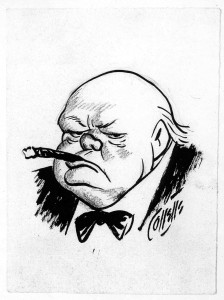Murder (“The West”) Incorporated
“Is World War II Still ‘the Good War’?” by Adam Kirsch. The New York Times Sunday Book Review, 27 May 2011.  Adam Kirsch, a senior editor at The New Republic, offers a thoughtful piece of deconstruction which dredges up every major Churchill critic of the past five years, all in one handy if verbose article. As a sampling of the Churchill fever swamps, it is unsurpassed.
Adam Kirsch, a senior editor at The New Republic, offers a thoughtful piece of deconstruction which dredges up every major Churchill critic of the past five years, all in one handy if verbose article. As a sampling of the Churchill fever swamps, it is unsurpassed.
The question we are asked to consider is whether World War II was really a “good war.” War is hell, which is why western democracies like Britain and France spent six years trying to avoid it. Once it had begun, the (barely) surviving partner (Britain) had a choice between barbarians, one of whom hadn’t (yet) expanded beyond his borders. Easy choice—especially without the benefit of hindsight.
Kirsch quotes Norman Davies’ No Simple Victory (which mirrors Stanley Baldwin’s logic 75 years ago): “If one finds two gangsters fighting each other, it is no valid approach at all to round on one and to lay off the other.” Maybe—if one of the two isn’t trying to eradicate your country.
Mr. Kirsch is certainly thorough, industriously Hoovering every far-out Churchill critique, all of which he represents uncritically: Gordon Corrigan’s Blood, Sweat and Arrogance, Richard Toye’s Churchill’s Empire, Christopher Catherwood’s Churchill’s Folly, Nicholson Baker’s Human Smoke, and Pat Buchanan’s Churchill, Hitler and the Unnecessary War. This must be the first time a New Republic editor has nodded respectfully toward Pat Buchanan.*
Just when I was thinking he had overlooked the most virulent myth of all, that Churchill somehow encouraged and abetted the 1943 Bengal Famine, in the book Churchill’s Secret War), Kirsch dredges it up on the third page of this lengthy treatise. Churchill, that sly old imperialist, “refused to divert resources from feeding Britain to feeding India.”
Leave aside that this isn’t true. Are we to conclude that it was better to starve one of the three major protagonists against Hitler than to starve India—whose 1943 famine was exacerbated by Japan, with the help of corrupt local officials?
To say Churchill “was fighting to preserve imperialism as well as democracy” is a bad reading of history. India’s independence was on track by 1935, that of the Dominions was assured by the Statute of Westminster in 1931. Churchill was fighting to preserve institutions like The West, Inc., which allow people like Mr. Kirsch the freedom to wring their hands over the dreadful things we inflicted on Hitler’s Germans. That the bombing of Dresden was requested by the Soviets goes unremarked.
Finally, presumably in a gesture toward equal time, Mr. Kirsch considers Michael Burleigh’s Moral Combat:
Burleigh fulminates, “Wars are not conducted according to the desiccated deliberations of a philosophy seminar full of purse-lipped old maids.” This is crude and bad-tempered, but Burleigh’s defensive impulse is understandable.
I’m so pleased that Mr Kirsch finds Burleigh’s fulminations understandable that I will offer him another, my favorite on the whole subject, from Lady Soames: “My father would have done anything to win the war, and I daresay he had to do some pretty rough things. But they didn’t unman him.”
✷✷✷✷✷
* All these books received appropriate responses by qualified reviewers, to which I can direct any interested reader. I have not provided links to Amazon, because we read them for you, so you don’t have to.







2 thoughts on “Murder (“The West”) Incorporated”
Lady Soames: “My father would have done anything to win the war, and I daresay he had to do some pretty rough things. But they didn’t unman him.” Quite right. And let me add that a good executive -especially in time of war- has to be tough. Churchill understood that there could be no peace with a maniac like Hitler. Hitler had his V-weapons and if left alone he may have developed longer range jet bombers and the atomic bomb. No one can doubt that Hitler would have used his A-bomb. It was absolutely imperative that the Nazi regime be expunged and their war-making power destroyed. If you are in a life and death struggle as Britain was you have to win because as Churchill himself said, “without victory there is no survival.” There was a man who could look reality in the face. We could use a man like him today.
good remarks by mr langworth .
Comments are closed.